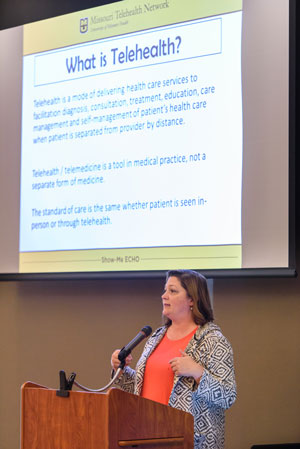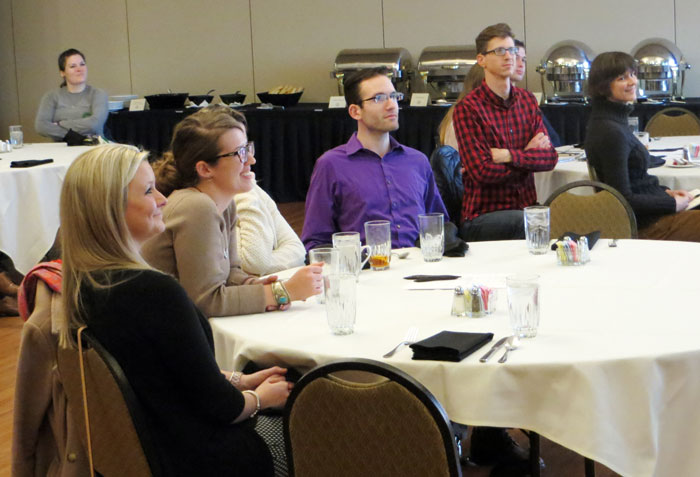University of Missouri School of Medicine Rural Track Elective Program Opportunities
- Need: Increase number of medical providers in rural Missouri.
- Intervention: Grant-supported expansion of the Rural Track Training sites with additional medical student and resident rural curriculum offerings.
- Results: Since the 2016-2017 academic year, 50 medical students have rotated at the training sites supported by this grant and more than 350 medical students and residents have attended the focused lecture series.
Description
 As part of an
Rural Track Pipeline Program grant award, the
University of Missouri School of Medicine's (MU SOM)
Rural Health Department continues to expand rural
training experiences through its most recent addition,
the
Rural Scholars Program.
As part of an
Rural Track Pipeline Program grant award, the
University of Missouri School of Medicine's (MU SOM)
Rural Health Department continues to expand rural
training experiences through its most recent addition,
the
Rural Scholars Program.
Along with this program, the department has added the Rural Medicine Lecture Series as a supplement to the curriculum of both medical students from multiple disciplines in the health professions and MU residents in family medicine, child health, internal medicine, obstetrics and gynecology, surgery, neurology, and psychiatry.
Additionally, an interprofessional Clinical Rural Immersion (CRI) Program has been implemented, a 2-week experience for health professions students (nursing, pharmacy, and medicine) interested in working in a rural area. Hosted in communities throughout the state, CRI is an interprofessional also a non-clinical immersion experience designed to highlight the social and communal aspects of rural life. Through group activities and meetings with community leaders, participants get a preview of life as a rural healthcare professional.
Non-clinical practice management rotations in practice management are also offered to residents. Providing an opportunity to learn more about clinic operations, this program is sponsored through a grant from the Missouri Department of Health and Senior Services. Funding through the Federal Office of Rural Health Policy has also supported some elements of these programs.
Services offered
Rural track medical student electives include:
- Child Health
- Dermatology
- Emergency Medicine
- Family & Community Medicine
- Internal Medicine
- Neurology
- Obstetrics & Gynecology
- Psychiatry
- Radiology
- Surgery
Nine communities are participating as rural track training sites: St. Joseph, Sedalia, Osage Beach, Sikeston, West Plains, Farmington, Cape Girardeau, Branson, and Hannibal. Housing is provided at these training sites and students may travel up to 30 minutes to complete rotations in other nearby location. Four of these sites subcontract for funding from the Rural Medical Services Grant to cover administrative and student support services such as housing: Osage Beach, Sedalia, Cape Girardeau, and Branson. Students may return to these training sites or choose others for a 4-week elective in primary care or a non-primary care specialty for additional clinical experience.
Additionally, several residents per year are selected to rotate in the local Child Health NICU to prepare for rural practice.

Results
As of December 2020, the fifth year of the federal grant program, nearly 500 medical students and residents have participated in these rural-focused offerings.
For more information on these efforts, please see the feature article in the Rural Monitor, Mizzou Educates the Next Generation of Rural Providers through Lectures, Clerkships, and Community Integration.
Challenges
Implementation challenges include recruiting residents for the one-month clinical and non-clinical practice management rotations due to the rigorous nature of many residency programs and the cost of replacing a resident's income for the month while completing an offsite clinical residency rotation.
An additional perceived challenge was extended time away from the academic health center.
To manage these challenges, practice management rotations have shifted to focus on continued student and resident participation in the Rural Medicine Lecture Series.
Contact Information
Kathleen Quinn, PhD, Associate Dean for Rural HealthUniversity of Missouri Health, School of Medicine
QuinnK@health.missouri.edu
Topics
Health workforce education and training
States served
Missouri
Date added
December 3, 2018
Suggested citation: Rural Health Information Hub, 2023 . University of Missouri School of Medicine Rural Track Elective Program Opportunities [online]. Rural Health Information Hub. Available at: https://www.ruralhealthinfo.org/project-examples/1044 [Accessed 17 February 2026]
Please contact the models and innovations contact directly for the most complete and current information about this program. Summaries of models and innovations are provided by RHIhub for your convenience. The programs described are not endorsed by RHIhub or by the Federal Office of Rural Health Policy. Each rural community should consider whether a particular project or approach is a good match for their community’s needs and capacity. While it is sometimes possible to adapt program components to match your resources, keep in mind that changes to the program design may impact results.
